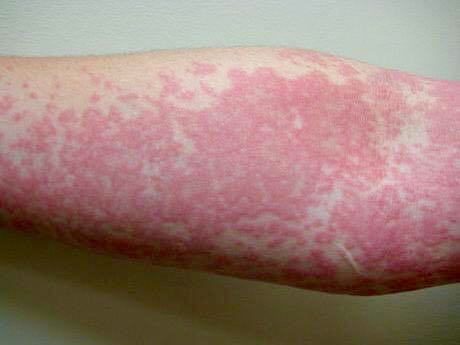Sunshine, hives and atopic eczema
|
author/source: DrB

- Urticaria is the medical term for what is also called hives, or nettle rash.
- It is a type of skin reaction that has many causes.
- Solar urticaria is a relatively rare type of urticaria. It is found world wide.
- It can start at any age, but those aged between 20 and 40 are most affected.
- Itchy wheals appear within minutes on sun-exposed areas, or where clothing is thin.
- The sun rays responsible include both ultraviolet A and ultraviolet B, but also visible light.
- Although the reaction is often relatively brief (less than 2 hours), the sensitivity to sunshine tends to be persistent. Only in some cases it resolves spontaneously.
- The reaction is often confused with the more common polymorphic light eruption. Here the reaction to sunlight lasts much longer (more than 48 hours).
Prevention
- Avoiding direct sunlight
- Use of a reflectant sunscreen: conventional screens are usually not effective
- Photoprotective window films can be used on both the windows of a car, and windows of the home
- NB: If these measures are required long term, there is a risk of developing Vitamin D deficiency
Treatment
- Antihistamine medication: needs to be taken regularly, sometimes more than one type at the same time, and at higher doses than normal.
- Steroid medication by mouth is occasionally required.
- Phototherapy is sometimes used.
Atopy, urticaria and sunshine
- Atopy refers to the link that exists between three illnesses: atopic eczema, asthma and hay fever, the so-called atopic triad. Atopy is associated with some types of urticaria, especially those provoked by heat, physical exercise, stress and eating spicy food - cholinergic urticaria.
- However, the good news is that solar urticaria is not reported as especially associated with being atopic.
- Sunshine generally helps improve atopic eczema, but sun aggravated atopic eczema also occurs.
See:
- Are all-day suncreams a good idea?
- Holidays and eczema: better or worse?
- Phototherapy and atopic eczema
- Sunshine, vitamin D and eczema
- Sunblocks, sun-skin reactions and atopic eczema
